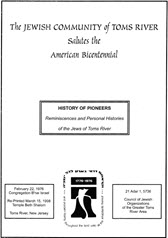HOROWITZ FAMILY
The early part of 1928, I took my first trip out of New York City. My father was told by his doctor that it was urgent that he leave New York for his health and settle someplace in the quiet of the country. This meant leaving the luxury surroundings of the Bronx and the garment loft on 7th Ave.
The guiding arm for Jews wishing to settle in the country was the Jewish Agricultural Society. They pointed us towards Toms River where Pop and I went to survey possible sites for a chicken farm. I was 7 years old and remember the trip from the Bronx. It was an expedition of subways, ferry and trains. We were met in Toms River and shown around to various sites. I recall one place Pop thought unsuitable because of its location. It was a property on Route 37. (He was right, as the location was only good for shopping centers).
Well our dream farm was chosen on Long Swamp Road, later changed to Broadside Drive, which sounded more fashionable to developers.
Now the time came to move and shortly before Thanksgiving we packed and again took the journey to far away Toms River; Mom, Pop and five children. We arrived early that day and awaited the truckers . I remember the day well. It was cold and dreary around the house, with 2 older sisters wondering what we were doing here (I can imagine how the early settlers felt).
The chill of the day was not helped by the coal furnace in the basement with only one heating outlet in the center of the dining room floor, (so unlike the modern houses moved into by later farmers).
Well, the truckers finally arrived about 8 hours late due to their finding some wine Mom had made for the holidays. That cold day we all stood gazing out the window at a barn and a strange building called a coop. I kept asking where the candy store is, forgetting this wasn't the Bronx.
Things have a way of falling into place and taking shape. We started school and made friends with neighbors who were happy to see that we looked human.
We soon received cute little baby chicks which grew up to be very stupid. They were raised in quaint little buildings called brooder houses. This part was fun for about 3 days. Then I found myself pushing a wheelbarrow around for hours; feeding, watering and lugging pails of coal to each brooder house to keep the stoves going for heat. I forgot to mention, we had no water in the fields so we would carry 2 pails at a time from the house about 1/2 mile away. I was developing muscles you can't get in the Bronx. Later on we had the luxury of a hand pump for water installed in the fields.
Time passed and soon these cute chicks were laying eggs, and the fruits of your labor were seen. Now we had to prepare new quarters for these chickens called laying houses. You prepared like it was a festival, spreading litter on the floors, hanging up nests, arranging feed hoppers and egg shell boxes - what funny names.
Now we went out in the night and caught the pullets as they were called, and carefully stuffed them in crates. Being we had no other transportation, I learned to stack these crates high on a wheelbarrow and push them like a donkey to their new quarters. As I write this , I don't know if I was strong or stupid.
Well, we were now in full swing; eggs coming in for real money. I started to learn new words like "go pack the eggs", "candling", "wet mash" and "go clean the dropping board." Soon we progressed to a horse and some cows. Again some new expressions "go clean the barn''. It seemed all you did on the farms was clean something. The horse relieved me of some work but also moved very slowly. I recall riding to Lakewood, via horse and wagon, to go to the Schchet with Pop. What a fun day; 10 hours round trip.
We were eating well, and in the spring, planted large gardens, did canning and prepared for another season, a little wiser and more adept at raising chickens.
Time passed and I became an expert at culling chickens (catching a chicken with a hook on the run), milking cows and brushing on black leaf forty (not a job for city people). All these chores were sure to help me in later life when I opened a dress shop. We also knew the summer was over when all the relatives left and promised to return for Thanksgiving.
By now we were learning how to cope with coccidiosis production drops, molting birds, water pipes breaking, high feed costs, low egg prices and a hundred other things.
We looked forward to meetings and get togethers at the Jewish Community Center where we discussed everything and found out your problems were not unique. Work was hard and somehow you added to the size of your farm, improved your standard of living, bought a car and developed a closeness of family interest. Time passed and we all went our separate ways.
Now we all have the fine conveniences of modern living. I don't push wheelbarrows anymore, haven't cleaned a dropping board in years, and as I look back I often day dream of sitting in the warm brooder house with the chirping and lovely aroma of small baby chicks, which now seems like a different world ago.
